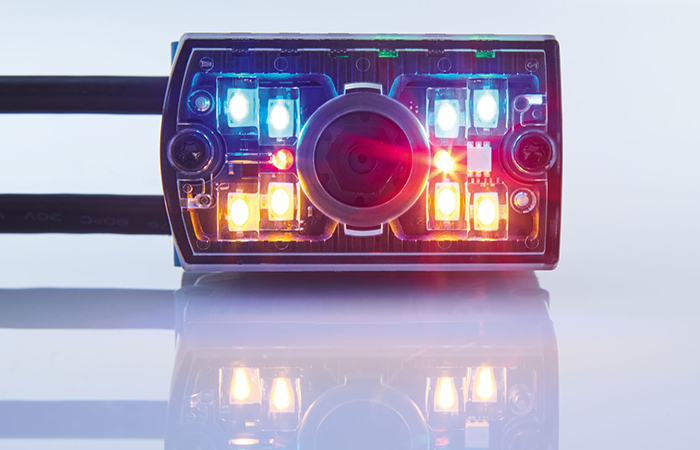
SICK has launched an ultra-compact and ultra-powerful all-in-one 2D vision sensor, the InspectorP611, which can be set up rapidly to conduct highly-reliable inline machine vision inspections even in the tightest of machine spaces, or when mounted on robot arms.
With the SICK InspectorP611 2D vision sensor and pre-installed Quality Inspection SensorApp, users rapidly configure inline inspection, part localisation and measurement tasks to run automatically on the device.
Small enough to be mounted right where it is needed inside a machine, the InspectorP611 is ideal for measuring or verifying the finer details of small assemblies, electronics components or glue beads, for example. Tiny and lightweight, it can also be mounted on robot arms to provide real-time quality checks and positioning for tasks such as the insertion of small screws.

Rapid Installation and Configuration
Following instant installation with snap-in mounting, users quickly obtain high-quality images ‘out of the box’ with the SICK InspectorP611’s integrated optics and adjustable LED illumination. Simply connect the SICK InspectorP611 to a PC with a standard web-browser interface to configure a wide choice of machine vision tools to run directly onboard the camera, sufficient to set up most applications in no time. Additional flexibility is also built-in to expand or customise inspections, together with the option to progress with ease to SICK’s Intelligent Inspection Deep Learning SensorApp for more challenging inspections, when required.
“It might be the smallest of the InspectorP600 family of programmable 2D vision sensors, but the SICK InspectorP611 packs the power of its larger siblings into a miniature device that fits in the palm of your hand,” said Neil Sandhu, SICK’s UK Product Manager for Imaging, Measurement and Ranging.
“Whether you are a novice or an expert, it is quick and easy to configure your machine vision application using the onboard image processing tools provided within the SICK Quality Inspection SensorApp. It’s also simple to download additional free tools for specific applications, such as glue bead inspection, while more experienced users have the flexibility via the programming interface to access time-saving, ready-made code so they can fast-track customised inspections. Meanwhile even inexperienced users can progress to Deep Learning, starting from a low cost of ownership.”

High Quality Image Processing with Flexible Illumination
The SICK InspectorP61x is a versatile 2D vision sensor just 50 x 40.3 x 29.6 mm in size. It processes high-quality images with up to 1.2 Mpixel resolution, ideal for small- and medium-sized objects, even at very short distances down to 50mm. Its built-in illumination assures optimum results even at tight angles and supports reliable inspection all the way up to 300mm, enabling a much larger field of view when required.
In-situ camera set-up time is minimal, thanks to a choice of 6mm or 12mm pre-installed lenses, together with the InspectorP611’s innovative integrated illumination. An array of blue and amber LEDs built into the sensor housing enables the user to fine tune the brightness, colour and shape of the illuminated inspection area to achieve the best possible image processing results.
Pre-installed Quality Inspection Software
In common with all the SICK InspectorP600 family of 2D vision sensors, the InspectorP611 comes with SICK’s Quality Inspection SensorApp already installed. Users are guided through easy point-and-click configuration, and have the freedom to add, combine and customise the machine vision tools they need. With the additional programming flexibility and tools within the SICK AppSpace software platform, users have the option to further extend their applications with minimal coding time, as well as to access the HALCON machine vision library.
Deep Learning Extension Option
Seamless integration with the SICK Intelligent Inspection Deep Learning SensorApp provides users with a rare opportunity using a vision sensor of the InspectorP61x’s tiny size to progress to Artificial Intelligence vision classifications. With the benefit of training a neural network based on real examples, users can try out the suitability of Deep Learning classification for their application before purchasing the additional license required. They can also use traditional rule-based vision tools together with Deep Learning to solve the application.
Image processing is conducted directly onboard the SICK InspectorP611 and the digital input and outputs offer versatile automation options for communication of measurement data to higher-level control systems, as well as for remote diagnostics and process monitoring. Its versatility for many applications is assured by a wide range of communications interfaces via Ethernet TCP/IP, FTP, EtherNET/IP®, and PROFINET fieldbuses.
For more information please contact Andrea Hornby on 01727 831121 or email andrea.hornby@sick.co.uk.










McMurtry Spéirling defies gravity using fan downforce
Ground effect fans were banned from competitive motorsport from the end of the 1978 season following the introduction of Gordon Murray's Brabham...